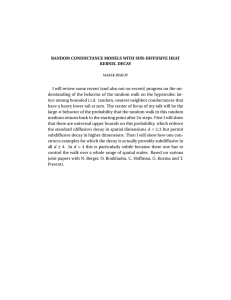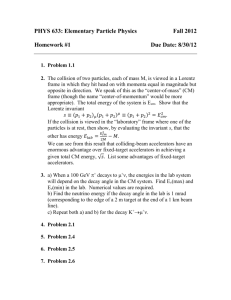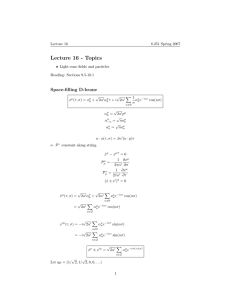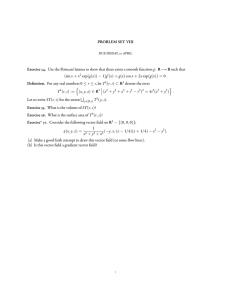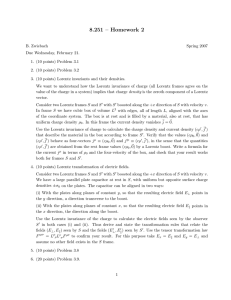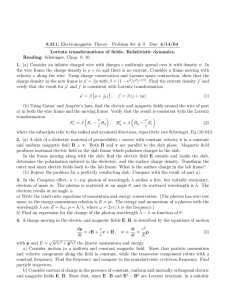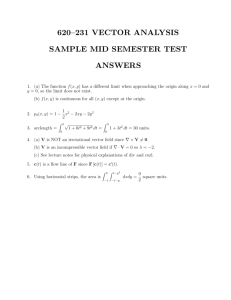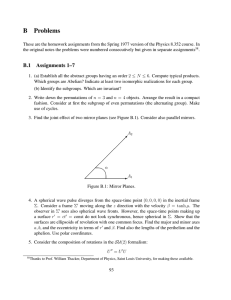Document 13470500
advertisement
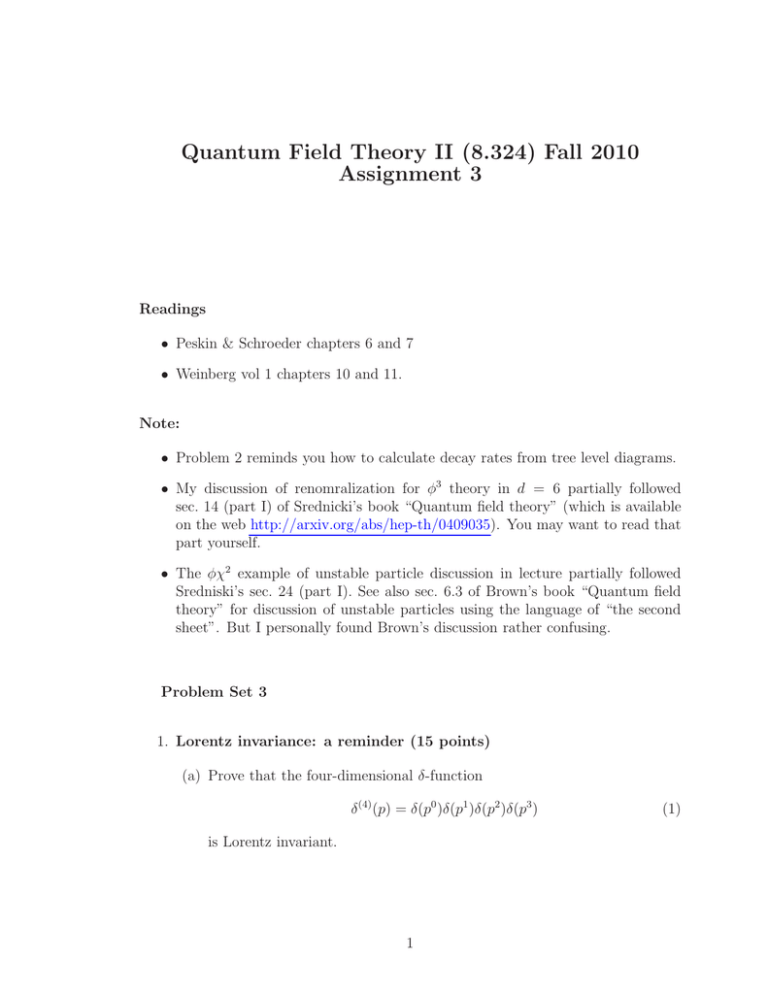
Quantum Field Theory II (8.324) Fall 2010 Assignment 3 Readings • Peskin & Schroeder chapters 6 and 7 • Weinberg vol 1 chapters 10 and 11. Note: • Problem 2 reminds you how to calculate decay rates from tree level diagrams. • My discussion of renomralization for φ3 theory in d = 6 partially followed sec. 14 (part I) of Srednicki’s book “Quantum field theory” (which is available on the web http://arxiv.org/abs/hep-th/0409035). You may want to read that part yourself. • The φχ2 example of unstable particle discussion in lecture partially followed Sredniski’s sec. 24 (part I). See also sec. 6.3 of Brown’s book “Quantum field theory” for discussion of unstable particles using the language of “the second sheet”. But I personally found Brown’s discussion rather confusing. Problem Set 3 1. Lorentz invariance: a reminder (15 points) (a) Prove that the four-dimensional δ-function δ (4) (p) = δ(p0 )δ(p1 )δ(p2 )δ(p3 ) is Lorentz invariant. 1 (1) (b) For any function f (p) = f (p0 , p1 , p2 , p3 ) prove that � � d3 p~ 1 f (p), ω = p~2 + m2 p ~ (2π)3 2ωp~ is Lorentz invariant in the sense that � � d3 ~p 1 d3 p~ 1 f (p) = f (p̃) (2π)3 2ωp~ (2π)3 2ωp~ (2) (3) where p̃µ is a Lorentz transformation of pµ . (c) Let |k� denote a one-particle state with momentum k 2 = −m2 . Prove that Z = |�0|φ(0)|k�|2 (4) is a k-independent constant, where φ is a scalar field. 2. Calculating decay rates (25 points) For this you should recall that when � � � �p1 , p2 , · · · pn ; +|p; −� = −i (2π)4 δ 4 p − pf T (p1 · · · pn ; p) , the decay rate Γ is then given by n � �� � � � d 3 pi 1 � 1 4 4 Γ= (2π) δ p − pf |T (p1 · · · pn ; p)|2 0 . 0 3 (2π ) 2pi 2p i=1 (1) (2) A factor of 1/k! must be added for each group of k identical particles in the final state. (a) Consider two scalar fields φ and χ coupled by L = − 21 (∂µ φ)2 − 21 M 2 φ2 − 12 (∂µ χ)2 − 21 m2 χ2 + 12 gφχ2 . Assume M > 2m and calculate the decay rate of φ-particles to the lowest order in g. (b) Let A, B, C and D be four real scalar fields with dynamics governed by the Lagrangian � � L = − 21 (∂µ A)2 + m2 A2 + (∂µ B)2 + (∂µ C)2 + (∂µ D)2 − g ABCD . Calculate the decay rate Γ of the A particle to lowest order in the coupling constant g. How would the decay width change if the interaction g ABCD is replaced by gAB 3 ? 2 3. Spectral representation for a spinor field (30 points) Derive the spectral representation for the vacuum two-point function of a spinor field, i.e. for � � DF (x, y) = 0|T ψ(x)ψ † (y)|0 . (5) Separate your spectral decomposition into the single-particle and multipleparticle part assuming that there is only a single set of single-particle states of mass m. 4. Imaginary part of the self-energy from cutting the propagators (30 points) Consider two scalar fields φ and χ coupled by L = − 12 (∂µ φ)2 − 12 M 2 φ2 − 12 (∂µ χ)2 − 12 m2 χ2 + 12 gφχ2 . in d = 6 spacetime dimensions and assume M > 2m. (a) Calculate the imaginary part of the one-loop self-energy ImΠ(p2 ) for φ by putting all the internal propagators on shell and verify this is the same as what we obtained in lecture by direct calculation. (This equivalence makes it manifest that the imaginary part is UV finite.) (b) Evaluate the expression you got from (a) at p2 = −M 2 and show that it is equal to mΓ with Γ the decay rate of φ. (c) In lecture we determined the full expression for Π(p2 ) by requiring � dΠ �� 2 =0 Re Π(−M ) = 0, Re 2 � dp p2 =−M 2 (6) Show that near p2 = −M 2 , the propagator for φ can be approximated as GF (p2 ) = Z +··· p2 + M 2 − iMΓ (7) Find the explicit expression for Z to order O(g 2). (d) Consider the time dependence of the propagator � dω −iωt GF (t, ~p) = e GF (ω, ~p) 2π (8) Evaluate (8) for t > 0 using (7) (you can ignore · · · in (7)). Examine the expression you find in the regime t ≫ M1 and extract the lifetime of the particle. Compare the lifetime with Γ−1 and explain the difference. 3 MIT OpenCourseWare http://ocw.mit.edu 8.324 Relativistic Quantum Field Theory II Fall 2010 For information about citing these materials or our Terms of Use, visit: http://ocw.mit.edu/terms.
